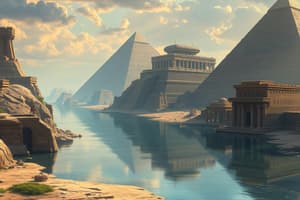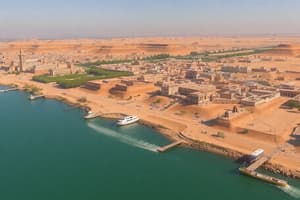Podcast
Questions and Answers
What is one significant challenge Egypt faces related to its natural resources?
What is one significant challenge Egypt faces related to its natural resources?
- Overfishing in the Mediterranean Sea
- Water scarcity connected to the Nile River (correct)
- Abundance of arable land
- Surplus of freshwater from the Nile River
How does the population distribution in Egypt affect socio-economic conditions?
How does the population distribution in Egypt affect socio-economic conditions?
- Poverty is more prevalent in urban regions than rural ones
- Rural areas contain a larger proportion of people living in poverty (correct)
- Urban areas have higher levels of education compared to rural areas
- Rural areas experience less population growth than cities
Which demographic characteristic is notable about Egypt's population?
Which demographic characteristic is notable about Egypt's population?
- It has a largely young population (correct)
- It has an aging population with a high median age
- It has a declining birth rate
- It is predominantly composed of a single ethnic group
What is one cultural aspect that influences Egyptian society?
What is one cultural aspect that influences Egyptian society?
What type of instability does Egypt face that impacts its social conditions?
What type of instability does Egypt face that impacts its social conditions?
What is the official language of Egypt?
What is the official language of Egypt?
Which of the following accurately describes Egypt's climate?
Which of the following accurately describes Egypt's climate?
What aspect of Egypt's economy is heavily reliant on the Nile River?
What aspect of Egypt's economy is heavily reliant on the Nile River?
Which famous pharaoh is known for having a nearly intact tomb discovered in the 20th century?
Which famous pharaoh is known for having a nearly intact tomb discovered in the 20th century?
What percentage of Egypt's land is covered by deserts?
What percentage of Egypt's land is covered by deserts?
Which of the following statements about Egypt's political system is true?
Which of the following statements about Egypt's political system is true?
What is one major challenge currently facing Egypt's economy?
What is one major challenge currently facing Egypt's economy?
Which ancient structures are notable examples of Egypt's architectural achievements?
Which ancient structures are notable examples of Egypt's architectural achievements?
Flashcards
Egypt's Location
Egypt's Location
Egypt is a transcontinental country, mostly in Northeast Africa, with a small part in Southwest Asia.
Nile River's Importance
Nile River's Importance
The Nile River is essential to Egypt's water supply and fertile land, supporting human settlement.
Egyptian Economy
Egyptian Economy
Egypt's economy relies on tourism, agriculture, and industrial production.
Ancient Egypt's Impact
Ancient Egypt's Impact
Signup and view all the flashcards
Egypt's Climate
Egypt's Climate
Signup and view all the flashcards
Egyptian Population Distribution
Egyptian Population Distribution
Signup and view all the flashcards
Egypt's Political System
Egypt's Political System
Signup and view all the flashcards
Historical Influence of Egypt
Historical Influence of Egypt
Signup and view all the flashcards
Egypt's demographics
Egypt's demographics
Signup and view all the flashcards
Egypt's challenges
Egypt's challenges
Signup and view all the flashcards
Egyptian culture
Egyptian culture
Signup and view all the flashcards
Cultural institutions
Cultural institutions
Signup and view all the flashcards
Water scarcity in Egypt
Water scarcity in Egypt
Signup and view all the flashcards
Study Notes
- Egypt is a transcontinental country spanning northeast Africa and southwest Asia.
- Its capital is Cairo, the largest city in both Africa and the Arab world.
- The population is over 100 million people.
- Egypt's official language is Arabic.
Geography and Climate
- Egypt is mostly desert, with the majority of its population concentrated along the Nile River valley and delta.
- The Nile River is a vital source of water and fertile land, which has shaped human settlement in Egypt for millennia.
- Egypt's climate is hot and dry, with significantly higher temperatures in the desert regions and lower temperatures during the winter in the Nile valley.
- The desert climate is characterized by large temperature fluctuations between day and night.
- Deserts cover nearly 90% of the country.
History
- Egypt has a long and rich history, with significant ancient civilizations which predate many other world cultures.
- Ancient Egypt's monumental structures like the pyramids and temples are remarkable testaments to their advanced engineering and artistry.
- Famous pharaohs, like Tutankhamun and Ramesses II, played critical roles in shaping the course of Egyptian history.
- Egypt has experienced various periods of rule and occupation throughout history, including Greek, Roman, Ottoman, and British periods.
- The country played a prominent role in international affairs and commerce for many centuries and is home to numerous historical sites.
Economy
- The Egyptian economy is mainly based on tourism, agriculture, and industrial production.
- Agriculture relies heavily on the Nile River's waters.
- Tourism is a major contributor to Egypt's economy, attracting visitors interested in its ancient sites.
- The Egyptian economy is facing challenges, including unemployment, poverty, and economic inequality.
- Industries including manufacturing, energy, and construction are also important parts of its economy.
Politics and Government
- Egypt is a republic with a president as head of state.
- The country has a complex political system.
- There are considerable efforts to improve the country's political and economic systems.
- Significant events and changes in governance and political ideologies have impacted the country significantly over time.
Culture
- Egyptian culture is deeply rooted in its ancient history and traditions.
- Music, art, and literature are influenced by centuries of artistic and cultural development.
- The influence of religion on cultural practices is profound and important.
- Egyptian culture has a unique blend of ancient traditions and modern influences.
- Cultural institutions and events are vital aspects of the country.
Demographics
- Egypt has a largely young population.
- Diverse social groups contribute to the richness of Egyptian society, which includes various ethnic and religious communities.
- The country faces challenges related to population growth and urban development.
- There is a significant number of people who live in poverty with a disproportionately larger proportion in rural areas compared to cities.
Challenges
- Egypt faces challenges including poverty, unemployment, social inequality, and political instability.
- Water scarcity is a significant issue in relation to the Nile River.
- Combating climate change is a priority for the country, which is increasingly affected by droughts and floods.
- Corruption is also a problem that impacts various sectors of society.
Studying That Suits You
Use AI to generate personalized quizzes and flashcards to suit your learning preferences.




